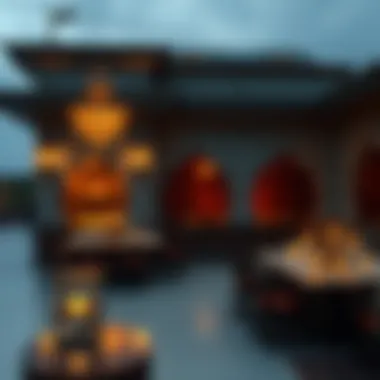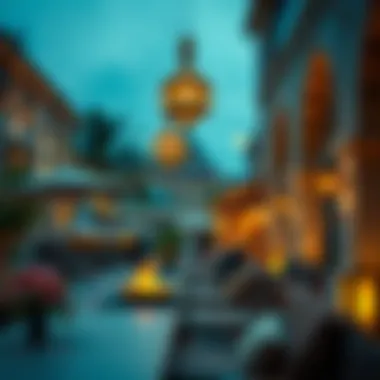Iftar Time 2023: Traditions and Cultural Insights


Intro
Iftar marks a significant moment during Ramadan, the holy month observed by millions around the globe. This meal, taken after sunset, serves not only as a time to break fast but also embodies a deeper cultural and spiritual essence. It is a gathering of family, friends, and often community, where traditional dishes accompany heartfelt conversations. In 2023, as the world continues to navigate through changing lifestyles and evolving practices, iftar customs reflect much of the contemporary dynamics.
During this time, people seek to reaffirm their ties to tradition while also embracing modernity, making iftar a fascinating topic of exploration. As we delve into this guide, we will journey through the various layers of iftar—from its importance in different cultures to specific dietary considerations and the evolving nature of communal gatherings.
The significance of timing cannot be understated during these evenings, as it varies across regions, and understanding it can enhance the experience. Additionally, local practices, especially in vibrant cities like Dubai, introduce delightful options for those observing the fast. The integration of modern lifestyles into traditional practices merits examination, shedding light on how iftar adapts while still holding true to its roots.
As we explore these elements further, expect to discover tips on nutrition for the breaking of the fast, unique local delicacies prevalent in Dubai, and how community events shape this cherished meal, ultimately enriching the overall Ramadan experience.
Understanding Iftar
Understanding iftar is crucial in grasping the broader context of Ramadan and its impact on communities and individuals alike. This meal, breaking the fast during the holy month, is not merely about the food consumed but encapsulates a rich tapestry of traditions, spirituality, and communal bonding that spans cultures and continents. Recognizing the significance of iftar paves the way for appreciating its role in fostering connections and the deeper meanings behind the practices associated with it.
Definition and Significance
Iftar refers to the fast-breaking meal observed by millions of Muslims worldwide at sunset during Ramadan. The term itself derives from Arabic, meaning "to break the fast." This ritual carries profound significance, symbolizing more than just nourishment after hours of fasting. It represents community, gratitude, and reflection. For many, it serves as a moment of spiritual connection, allowing individuals to pause and appreciate their blessings before partaking in a meal that often includes dates, water, and a variety of dishes that reflect regional culinary traditions.
The importance of iftar is also reflected in the social gatherings that accompany it. Families and friends come together to share this meal and express their gratitude for sustenance and companionship. This collective breaking of the fast emphasizes unity, reinforcing social ties and cultural heritage within diverse communities.
Historical Context
Historically, the practice of iftar dates back to the times of Prophet Muhammad, who emphasized its importance as part of the Ramadan observance. It has evolved as a cornerstone of Ramadan rituals, steeped in both spiritual and communal practices. Early Muslims used simple provisions to break their fast, often sharing food with those less fortunate, which underscores the values of compassion and generosity embedded in this tradition.
The practice has taken various forms over the centuries, influenced by regional customs and available ingredients. In many cultures, iftar tables have transformed, becoming grand displays of hospitality that not only satisfy hunger but also celebrate culinary diversity.
The iftar meal not only nourishes the body but feeds the spirit, cultivating bonds that elevate the act of eating into a celebration of life itself.
In contemporary society, iftar also reflects the significant changes that have emerged due to globalization. Modern influences see people experimenting with traditional recipes, mixing old with new. This blend of flavors and techniques not only breathes fresh life into traditional meals but also fosters a sense of unity among cultures, as communities find new ways to celebrate Iftar together, regardless of background.
Understanding iftar thus reveals its dual role: as a deeply spiritual practice and a vibrant social occasion that adapts over time while retaining its core significance. This understanding shapes not only individual experiences but also wider community practices that cultivate connections and enrich the tapestry of Ramadan.
Iftar Time in
Understanding Iftar Time is crucial to fully appreciating the deeper significance of Ramadan. It is not just about breaking a fast; it relates to cultural, spiritual, and even communal aspects that shape the observance of this holy month. In 2023, the timing of iftar is especially significant, as it intertwines with global movements, community activities, and personal health decisions. This year, underlining the importance of Iftar Time within the broader context of Ramadan allows us to see how various elements play into the lives of everyone involved.
Calculating Iftar Times
Calculating iftar times requires recognizing the position of the sun, which varies greatly depending on your geographical location. Many follow Islamic guidelines based on the Maghrib prayer time, when the sun has set. In urban settings and highly vibrant cities like Dubai, precise timing is key for millions to synchronize their meals. There are various methods to calculate these times:
- Religious Organizations: Many mosques and Islamic centers publish accurate timings based on lunar calendars. They often include prayer schedules for the entire month, reflecting local sun positions.
- Mobile Apps: Numerous apps can provide iftar times in real-time based on your location. These apps often come with additional resources like dietary recommendations for the iftar meal.
- Online Time Calculators: Websites also offer calculators where users input their location to retrieve accurate iftar times. This method is popular for traveling Muslims who may not be consistent in a single area.
Making a note of the day-to-day changes is also important, as iftar time shifts slightly each day throughout Ramadan. Keeping an updated calendar helps avoid any mishaps when it comes to breaking the fast.
Regional Variations in Timing
The timing of iftar varies widely across regions due to differing sunset times, which can create a mosaic of iftar experiences. For example:
- Middle East: Countries like Saudi Arabia typically have iftar at around 6:30 PM in late March, while in places such as Oman, the time might differ by roughly 15 minutes.
- Southeast Asia: In Indonesia, people merrily await iftar around 6:00 PM, allowing for lively gatherings in larger family groups, which could emphasize their rich cultural practices during the occasion.
- Western Countries: In the UK, iftar timing can fluctuate greatly; regions in the north may see the sun setting as late as 9:30 PM during the summer months, thus presenting unique challenges for observant Muslims.
Moreover, communities may celebrate their traditions tied to iftar timing. The local significance attached to particular times can lead to variation in meal preparations, comprising dishes special to that region.
"Iftar connects us all, irrespective of where we stand on this globe. It serves as a reminder of unity amidst diversity."
The actual hour at which this meal is shared holds great meaning and is often viewed as a trigger for celebration, reflection, and familial bonds. By understanding these variations, one not only appreciates the individual flavor of iftar but the rich fabric of traditions woven through time.
Culinary Traditions at Iftar
Iftar is not just the act of breaking a fast; it serves as a thread that weaves together communities, cultures, and culinary practices. The essence of iftar lies deeply embedded in the traditional foods and beverages shared among family and friends. These culinary traditions offer a glimpse into cultural diversity, making each gathering unique while also fostering a sense of belonging.


During Ramadan, the custom of enjoying locally cherished dishes strikes a special chord. Each dish tells a story, rooted in history, regional flavors, and religious significance. The array of iftar meals showcases the creativity and resourcefulness of different cultures. It's important to note that while specific customs may vary, the underlying sentiments of sharing and gratitude remain constant across the globe.
Common Dishes Across Regions
Across various cultures, iftar menus reveal a vibrant tableau. In the Middle East, a communal table groans under the weight of dates to break the fast, paired typically with or fresh juices. In countries like Lebanon and Saudi Arabia, you might find fattet hummus – a feel-good, hearty dish combining chickpeas, yogurt, and toasted pita, drizzled with a tangy sauce.
In South Asia, samosas, those crispy pockets filled with spiced potatoes or lentils, are a favorite. Accompanied by tamarind chutney, they add a crunch to the meal, proving to be quite popular alongside a warm bowl of lentil soup. Meanwhile, Indonesian families might serve kolak, a sweet dessert made of bananas in coconut milk, offering a delightful balance to the savory dishes on the table.
Exploring these regional dishes provides insight into the community’s identity:
- Dates: Symbolic for breaking the fast, seen in all cultures.
- Samosas: A beloved snack across South Asia; symbolizes warmth and hospitality.
- Fattah: Represents Middle Eastern familial gatherings and richness of flavors.
- Kolak: A sweet reminder of many Indonesians' approach to combining flavors.
Iftar meals are as diverse as the communities that celebrate them. The beauty lies in how each dish is crafted not just to satiate hunger, but to enhance the spirit of togetherness.
Beverages to Break the Fast
As iftar approaches, the choice of beverages becomes as important as the food. Hydration after a long day of fasting is paramount, and culturally, drinks vary dramatically. In many Arab countries, rose water lemonade is a refreshing favorite, its fragrant aroma evoking nostalgia and celebration.
In contrast, a cup of chai – spiced tea made rich with milk – holds a significant place at iftar tables in South Asia, serving both comfort and warmth in every sip. Furthermore, traditional jallab, a mix of date syrup, water, and sometimes nuts, stands out among other beverages for its unique taste and health benefits.
In regions with tropical climates, fresh juices are common. Variants like mango lassi or coconut water not only quench thirst but also add a burst of energy after a day of fasting. The drinks often echo the region's produce, serving as a testament to local harvests and preferences.
The variety encapsulated in these beverages adds layers to the iftar experience, turning a simple meal into a festive occasion.
"Food is the ingredient that binds us together." - Unknown
Cultural Relevance of Iftar
Iftar stands as a pivotal cultural touchstone during Ramadan, weaving together threads of tradition, community, and spiritual reflection. More than just a meal that breaks the day’s fast, it serves as a means of fostering social bonds and reinforcing shared values. Each evening, as the sun dips below the horizon, families and friends gather to indulge in communal meals, marking the end of a day's fasting with a spirit of unity and appreciation. This is not simply about sustenance; it's about coming together in a celebration of faith, existence, and collective identity.
Community and Family Gatherings
Community and family gatherings during iftar are deeply rooted in tradition. These gatherings extend beyond the immediate family unit; often, they draw in neighbors, friends, and even strangers. Across cultures, the act of sharing food becomes a symbolic gesture of goodwill and hospitality. It’s not unusual for individuals to host large iftar dinners, where an assortment of dishes reflects the culinary heritage of the region. The joy is palpable as laughter and conversation fill the air, uniting participants in a warm atmosphere that transcends individual experience.
Consider the traditional meal setups in homes throughout Dubai, where dishes like samosas, hummus, and dates are commonplace. Elders often lead these gatherings, emphasizing the importance of togetherness during this special month.
"During Ramadan, the heart of the home beats strongest at the iftar table, bringing people from all walks of life together to share one simple truth: we are all in this together."
These gatherings reinforce familial ties and promote a sense of community. When people break bread together, barriers fade, and the shared experience fosters understanding and tolerance. Moreover, for new communities and expatriates living in places like Dubai, iftar becomes a cornerstone for building friendships and networks, as they are often invited into homes where they might otherwise feel isolated.
Charity and Sharing
Charity and sharing are vital components of the iftar experience. The ethos of giving during Ramadan resonates deeply with iftar traditions, as it is not just a time for families to fill their own plates, but a call to remember those less fortunate. Many individuals and organizations take the initiative to prepare meals for those in need. This act of generosity transforms the spirit of the meal from one of mere consumption to one of compassion and social responsibility.
In various neighborhoods, communal iftar events are organized, where everyone, regardless of their background, is invited. These events symbolize a collective effort to uplift the less fortunate, reinforcing the idea that the true spirit of Ramadan lies in empathy and kindness.
Additionally, local mosques often arrange charitable dinners, where donations are collected to support those who can't afford a proper meal. Through such endeavors, many individuals find a sense of purpose and fulfillment in aiding others, aligning closely with the deeper teachings of Ramadan.
Modern Adaptations of Iftar
Iftar, the meal that breaks the day-long fast during Ramadan, has undergone a fascinating evolution over the years, especially in urban settings like Dubai. As society continues to change, so do the traditions, customs, and practices surrounding this essential meal. The modern adaptations of iftar reflect not only cultural shifts but also the impact of globalization and technological advancements on how communities engage with this significant event.
Influence of Globalization
Globalization has created a melting pot of culinary influences that impact the way iftar is experienced today. In major cities like Dubai, you can find an array of international flavors merging with traditional dishes. For example, you might witness falafel tacos or sushi with Arabic flavors; this blending of cuisines caters to a diverse demographic.
With global communities living side by side, the accessibility of ingredients has also played a pivotal role. No longer are people limited to local produce. Imported goods enrich dishes, bringing together tastes from far-off lands. This phenomenon is particularly true during Ramadan, where many families experiment with new recipes, creating unique experiences at their daily iftar gatherings.
Moreover, social media has sparked a trend where people share their unique iftar settings, often featuring a fusion of traditional and contemporary foods. The influence of platforms like Instagram allows for a visual representation of iftar that encourages experimentation and creativity. The result is a mosaic of dining options that were unheard of a few decades ago.
Health Considerations


As dietary awareness rises, modern iftar practices pay close attention to health. Traditional rich and hearty meals are now complemented with lighter options, appealing to health-conscious individuals. People are increasingly opting for nutritious alternatives, minimizing fried foods and sugary drinks to maintain their well-being during the fast.
For instance, quinoa salads, grilled vegetables, and fresh juices are becoming common sights on iftar tables. This shift not only reflects a growing consciousness around health but also an understanding of Ramadan’s spiritual importance. The focus has shifted from simply filling the belly after a day of fasting to ensuring that food choices also nourish the body.
Additionally, many restaurants are now offering health-specialized iftar menus, catering to those looking for balanced meals. This reflects a sensitivity to diverse dietary needs and preferences, including vegetarian, vegan, and gluten-free options. By marrying traditional practices with modern dietary guidelines, the essence of iftar is preserved while adapting to current lifestyle demands.
By embracing these new variations, the essence of iftar is transformed while still respecting its roots.
Local Iftar Events in Dubai
When discussing iftar during Ramadan, one can't overlook the significance of local events in Dubai. This cosmopolitan city is a melting pot of cultures, and during Ramadan, the atmosphere transforms into one of unity and celebration. Local iftar events provide a platform for individuals and communities to come together, breaking their fast and sharing meals, thereby strengthening bonds amidst the fast-paced life of the city.
Public Iftar Gatherings
Public iftar gatherings are a key feature of the Ramadan experience in Dubai. These events are organized in various locations, from parks to community centers, allowing residents and tourists to engage in communal dining.
- Accessibility: Often free or at nominal costs, public iftars make the experience accessible to everyone, regardless of their socio-economic background.
- Diverse Offerings: Participants can enjoy a wide array of traditional dishes that reflect Dubai's rich cultural tapestry. You might find everything from dates and lentil soup to biryani and shawarma. This diversity is not only a culinary experience but a celebration of culture.
- Building Community: Such gatherings foster social cohesion and are an excellent opportunity for people to meet neighbors they may not have interacted with otherwise.
Many of these events include additional features, such as prayer sessions and cultural performances, which help participants connect on a spiritual level and enhance their understanding of Ramadan's significance.
Dining-In Experiences
For those who prefer a quieter or more intimate setting, dining-in experiences during iftar have become increasingly popular in Dubai. Here are some points to consider when exploring dining options:
- Restaurants with Iftar Menus: Numerous restaurants craft special iftar menus tailored to the occasion, offering a selection of traditional and modern dishes that enhance the iftar experience. Examples include Z gourmet Lebanese or Al Hadheerah with its lavish buffet.
- Tranquil Ambiance: Many establishments create a serene atmosphere conducive to reflection and relaxation, often incorporating Ramadan decorations that add to the festive feel.
- Convenience and Comfort: Dining-in allows families to enjoy iftar together in a comfortable setting, avoiding the hustle and bustle of public events. This is particularly appealing for those with young children or those who may be less inclined to large gatherings.
From extravagant buffet spreads to intimate family dinners, the dining-in experiences during Ramadan cater to diverse tastes and preferences.
In summary, local iftar events in Dubai offer a unique blend of community participation, cultural celebration, and culinary delights. Whether joining public gatherings or enjoying a cozy meal at home, every option enhances the significance and experience of iftar during this holy month.
Religious Aspects of Iftar
When we talk about iftar, it is essential to look at the religious aspects that underpin this tradition during Ramadan. Iftar, the meal that breaks the fast each evening, is not merely a time for nourishment; it is steeped in spiritual significance. This practice serves as a reminder of faith, discipline, and community. In many ways, it transforms the daily routine of fasting into a profound expression of devotion.
Observance of Ramadan
Ramadan is marked by a commitment to fasting from dawn until sunset, a practice deeply rooted in the Islamic faith. This month is regarded as a time for reflection, self-improvement, and spiritual growth. During Ramadan, the act of fasting serves to strengthen one's relationship with God and instill a sense of empathy toward those who are less fortunate.
Fasting, in this context, is not simply about abstaining from food and drink; it encompasses avoiding negative behaviors and thoughts. The daily iftar meal is eagerly awaited, symbolizing a moment of gratitude and reflection after a day of discipline.
This observance is also a communal affair. Families and friends gather at sunset, sharing dishes that reflect diverse culinary traditions. Visitors witnessing this shared experience can appreciate that iftar is more than a meal; it’s a spiritual gathering that strengthens bonds and uplifts communities.
"Fasting leads to Taqwa (consciousness of God), which is at the heart of Ramadan."
Spiritual Reflections During Iftar
Iftar is not just about filling one’s belly; it is also a moment for deep spiritual reflection. As the sun sets and prayers fill the air, the atmosphere becomes charged with reverence. Often, people pause to express gratitude, engage in supplication (dua), and reflect on their personal spiritual journeys.
Many choose to take this time to read the Quran, seeking guidance and wisdom that aligns with the teachings of Islam. The rituals surrounding iftar serve to cultivate a mindful approach to eating, emphasizing appreciation for each bite and the bounty provided by God.
For many, this evening meal transforms into a sacred moment where they reconnect with their beliefs, setting the tone for personal and communal prayer that follows. It’s during these reflective moments that individuals often renew their intentions, seeking clarity on their spiritual goals moving forward, not just during Ramadan, but throughout the entire year.
Through the observance of Ramadan and the significance of spiritual reflections during iftar, individuals can nurture a deeper understanding of their faith while fostering connections within their communities. This commitment to personal growth and communal unity builds a foundation that transcends the month of fasting, influencing lifestyles even beyond Ramadan.
As such, iftar becomes a vital touchpoint in the lives of many, intertwining spiritual beliefs with cultural practices, whilst shaping the experiences of those who observe this holy month. The implications of iftar reach beyond the temporal, having meaningful effects on individual character and community dynamics.
Integration with Local Real Estate
The intersection of Ramadan with real estate trends offers a rich landscape for both residential and commercial developers. As communities engage in celebrations surrounding iftar, understanding how these practices shape property markets can provide valuable insights for investors and homebuyers alike. During this festive period, certain patterns emerge that can profoundly impact property values, demand, and development strategies in both urban and suburban settings.
Impact of Ramadan on Property Trends


Ramadan serves as a pivotal moment for real estate dynamics, particularly in areas with large Muslim populations. The time leading up to, and during Ramadan, often sees a noticeable uptick in demand for rental properties, especially those that are close to mosques or community centers. Families seek convenience during this month to easily access spaces for prayers and communal activities.
- Increased Demand: As Ramadan approaches, you may find that properties near popular iftar gatherings become highly coveted. Potential renters may prioritize proximity to ensure they can partake in community meals and religious activities without long travel times.
- Shifts in Pricing: Pricing strategies can shift during Ramadan. For instance, rentals in key areas might rise due to heightened demand. Investors should keep a keen eye on market fluctuations during this month to make informed decisions regarding buying or selling.
- Seasonal Offers: Some property management companies offer seasonal incentives during this time, hoping to attract tenants. Rent concessions or reduced fees can sometimes be seen as properties position themselves to be more appealing to potential renters.
In essence, Ramadan acts as a catalyst that can drive temporary trends in property transactions and valuations, encouraging proactive approaches from those in the market.
Iftar Spaces in Community Developments
As communities adapt to the essence of Iftar, many developers are recognizing the importance of creating inclusive spaces that facilitate these gatherings. Community developments increasingly strive to integrate features specifically designed for iftar gatherings.
- Dedicated Iftar Areas: Developers are now designing communal areas that provide space for residents to join together at sunset. These areas often feature outdoor seating, cultural decorations, and proximity to food vendors that cater to iftar needs.
- Flexibility in Design: Spaces that can be repurposed for various community events, such as iftar or Eid celebrations, enhance property appeal. For example, parks or communal halls in family-friendly neighborhoods invite communal dining experiences that strengthen community ties.
- Cultural Considerations: Accommodating cultural traditions in the architecture and landscaping not only elevates a community’s profile but also impacts property values positively. For instance, including water features or shaded areas can make these spaces more desirable during the hot summer evenings of Ramadan.
In summary, integrating considerations for iftar within real estate projects not only serves the immediate needs of a community but also aligns with broader market trends that value culturally sensitive approaches to property development.
Personal Reflections and Experiences
In this fast-paced world, where technology often overshadows tradition, the significance of personal stories during Iftar cannot be overstated. This section focuses on the unique perspectives residents and visitors have regarding Iftar in Dubai. It allows for a deeper connection to the real-world implications of breaking fast, emphasizing how much this moment transcends mere sustenance. These personal reflections not only highlight the importance of food but also encapsulate the broader social and cultural dynamics at play during Ramadan.
When individuals share their stories, it fosters a communal atmosphere, creating bonds that go beyond geographical boundaries. By recounting their Iftar experiences, people can express their values, traditions, and even their hopes. This sharing acts as a cornerstone for community building, especially in a multicultural setting like Dubai. Additionally, these narratives encapsulate the emotional weight of the event, brilliantly showcasing how food can serve as a medium for shared memories and experiences, drawing a tapestry of diverse backgrounds united under the fast.
Sharing Stories from Local Residents
Local residents often have vibrant tales that embody not just their traditions but the evolution of their Iftar experiences over the years. Many families have specific rituals that accompany the breaking of the fast, which range from preparing traditional dishes to the communal gathering at sunset. One resident, Fatima, recalls how her grandmother always insisted on serving lentil soup as the first course, a staple rich in flavor and history. "It brings us together and reminds us of our roots," she affirms.
Moreover, these stories highlight how modern influences have changed traditional practices. For instance, while one family may express a preference for classic dishes, another might opt for fusion meals, intertwining technology and culinary arts.
Benefits of Sharing These Stories:
- Preservation of Culture: Each narrative aids in preserving cultural practices for future generations.
- Strengthening Bonds: It encourages deeper connections within families and communities, as everyone has a story to tell.
- Inspiration: Visitors often find inspiration in these experiences, prompting a greater appreciation for local customs.
Visitor Experiences: Iftar in Dubai
Visitors to Dubai during Ramadan are often mesmerized by the vibrancy of Iftar activities. For many, it's a chance to witness cultural practices in real-time, a living tableau of community life. Tourists frequently express their awe at the hospitality extended to them. "I was warmly welcomed to join an Iftar gathering at my hotel, and it was a beautiful experience," shares Alex, a visitor from the UK. The evening transformed into a culinary pilgrimage, showcasing local delicacies such as dates and saffron rice.
Notably, many consider their Iftar experiences as a learning curve, where they gain insights not just into the food but the stories behind it. Whether it’s a family sharing their recipes or an organized event featuring various local chefs, every moment contributes to a richer understanding of the culture.
"I had never imagined how communal Iftar could be. It was not just about breaking fast but connecting with people through shared meals and laughter," reflects Maria, a traveler from Spain.
In summary, personal reflections and experiences of Iftar serve as a potent reminder of the transformational nature of shared meals. Whether it's a resident relaying family traditions or a visitor overwhelmed by kindness, these stories highlight the deeper meaning behind Iftar, painting a vivid picture of cultural affinity and communal spirit. Both perspectives enrich the narrative of Ramadan, showcasing the diverse experiences that unite people from different walks of life.
For further exploration of such culturally significant practices, you may refer to resources like Britannica or local community pages on Facebook.
Engaging with these reflections can enhance understanding not only of Iftar but also the cultural tapestries woven throughout Dubai.
Future of Iftar Practices
The landscape of iftar practices is undergoing noticeable changes, reflecting broader shifts in societal values, technology, and lifestyle choices. The significance of these shifts is multifaceted, as they not only shape how communities gather and celebrate but also influence how individuals engage with traditions. For real estate agents and developers, understanding these evolving practices is essential to tapping into the diverse needs of residents and visitors alike. The future of iftar carries weight not only in cultural significance but in its potential to enhance community engagement and commercial opportunities.
Evolving Traditions
Traditions surrounding iftar are far from static; they are adapting to the rhythms of modern life while still holding onto their rich cultural roots. One noticeable trend is the fusion of culinary practices, where classic dishes intertwine with international flavors. This evolution takes into consideration the palates of younger generations who are more experimental in their eating habits. For instance, it’s not uncommon to see traditional Arabic dishes served alongside Asian-inspired creations, such as sushi or spring rolls, during iftar gatherings.
Moreover, many families are beginning to personalize their iftar experiences. Instead of a uniform menu, there is a greater emphasis on individual preferences, dietary restrictions, and even aesthetics. This means that presentation plays a pivotal role; a beautifully set table with visually appealing dishes enhances the experience and encourages sharing on social media.
Furthermore, the communal aspect of iftar is transitioning as well. While large family gatherings remain commonplace, smaller, more intimate gatherings are also on the rise. Friends are inviting one another over, feeding not just the body but also the spirit of togetherness. Remote work and flexible schedules have allowed people to be more spontaneous in their plans, fostering a sense of community that may have been overshadowed in more traditional formats.
Technological Innovations in Iftar
Innovation is seeping into various aspects of iftar, bringing both convenience and connection. Many families and communities are increasingly relying on technology to enhance the experience. Apps designed for meal sharing or community potlucks are gaining traction. These platforms connect individuals with similar interests, encouraging them to come together for an engaging iftar experience.
Home automation tools play a role too. Smart kitchen appliances can help in preparing meals. With a few taps on a smartphone, one can preheat the oven or set cooking timers, allowing families to focus more on gathering rather than the intricacies of cooking. This is particularly relevant for those with busy schedules who wish to maintain the sanctity of the iftar meal.
Social media is another significant player in this evolving landscape. Sharing moments from iftar now transcends geographical boundaries. Individuals and families post their culinary creations and gatherings online, allowing others to partake in the experience virtually. This digital extension fosters a sense of global community that was less accessible in the past.
The future of iftar is not just about preserving what was; it’s about crafting what can be— deepening connections, embracing diversity, and leveraging technology.
As iftar practices evolve, the implications for community development and real estate cannot be overlooked. Developers are finding value in creating communal areas that cater to these new traditions, whether that’s through incorporating open kitchens in homes or designing multipurpose spaces for gatherings. As practices continue to shift, there will be a need for spaces that embrace these changing dynamics, ensuring that city planning remains relevant to the needs of the community.















